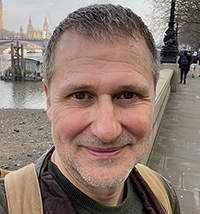
AN Israeli company that is having its wastewater data technology utilised across America has hailed Scotland as one of its ‘core markets’ and praised the population’s desire to protect its natural environment and public health.
Kando has recently partnered with Scottish Water and SEPA to implement its technology in and around ‘hundreds’ of the utility company’s assets and facilities.
The tech is a wastewater intelligence solution used for improving public and environmental health. It offers a real-time alert system capable of unlocking a range of actionable insights, allowing for the detection of events in the wastewater network before it reaches treatment plants – giving sufficient time to guard against damage to machinery.
It can also enable an increase in the amount of wastewater being recycled safely, with Israel currently reusing around 90% of its wastewater predominantly in its agriculture sector.
“When people say wastewater you don’t think of quality; quality is thought of for drinking water, but that (thinking) then has some pretty profound consequences,” Dr Andrew Engeli, VP community health strategy and services at Kando, told Project Scotland.
“We all understand that we’ve got a water crisis and we’re now not so much looking at it in terms of wastewater and drinking water; instead it’s water as a whole. Even some utilities companies are moving away from the language of ‘waste’ water, because ‘wastewater’ sounds negative – it’s still water, it just has other stuff in it.”
Describing Scotland as a ‘very welcoming environment’ to have discussions about the climate and reducing water waste, Dr Engeli said he has found the country to be a ‘natural partner’ for the firm due to the desire of communities to protect their local environment.
“I think there’s a real understanding of the importance of clean water and the climate in Scotland,” he explained. “There’s a real understanding in the country of the relationship between climate change and water vulnerability; that sounds funny to talk about in regard to countries where it rains a lot, but such countries still face very serious water challenges.”
Explaining that the firm’s immediate work in Scotland will target areas that are vulnerable and susceptible to industrial contamination, Dr Engeli said artificial intelligence within a wastewater network will be able to flag an event at a point where it can be dealt with. This in turn is hoped to allow more wastewater to meet SEPA’s ‘very strict’ standards on what treated wastewater can be released back into rivers and agriculture.
With Scotland’s increasing use of wastewater heat recovery systems to heat new developments, Dr Engeli explained that the technology can also allow for more value to be taken from the wastewater in this instance.
“The quality of water is so important because if you take any of that polluted water and try to extract heat, it still needs to pass through heat exchangers that can damage the equipment and be incredible costly,” he said.
“This equipment has to be insured and we can help water utilities reduce their insurance bills and reduce their equipment costs, which then means they can use more of that water if it’s for a heat exchanger or for water reuse – it really maximises the ability to extract value from wastewater.”
In America, the technology is primarily being used to detect viruses such as Covid-19 in wastewater. Prior to joining Kando, Dr Engeli was innovation lead at the Joint Biosecurity Centre, which is part of NHS Test and Trace, which undertook wastewater testing to allow local authorities and health professionals to take early targeted local action against Covid.
“This technology would never be able to stop something (a disease) – that’s not what we can do, but what we can do is slow it,” he added.
“The really great thing we can do with wastewater is predict ahead in a way that is hard to do from any other data source.
“If you think about it, when people are clinically tested they have already gone to the hospital, they’ve already got it – whereas from wastewater, we can produce quite forward looking estimations and that allows you to slow things down. That’s what we learned in the pandemic; being able to get rid of things entirely is probably not possible, but you can slow things down to a point where it can be managed.”
Dr Engeli said he is excited to see the technology put to work in Scotland, anticipating it will make big differences to the country. “Our whole focus is on community-level impact,” he explained. “We don’t start with the bottom line financially… but our company’s goal starts with cleaner, healthier communities and we found that Scotland in particular has those same things – so it seems like a natural partnership.”








